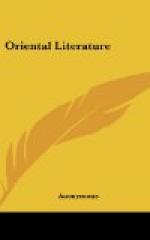The sheiks talked together for a long time, and meanwhile the flame of passion which had been kindled in the soul of the two heroes, Cais and Hadifah, became quenched. Hadifah withdrew from the fight, and it was agreed that Cais should pay as the price of Abou-Firacah’s blood a quantity of cattle and a string of camels. The sheiks did not wish even then to quit the field of battle until Cais and Hadifah embraced each other and had agreed to all the arrangements. Antar was crimson with rage. “O King Cais,” he exclaimed, “what have you done? What! while our swords flash in our hands shall the tribe of Fazarah exact a price for the blood of its dead? And we never be able to obtain retaliation excepting with our spear points! The blood of our dead is shed, and shall we not avenge it?” Hadifah was beside himself on hearing these words. “And you, vile bastard,” said Antar to him, “you son of a vile mother, must your honor be purchased at the expense of our disgrace? But for the presence of these noble sheiks I would annihilate you and all your people this very instant.”
Then Hadifah’s indignation and anger overleaped all bounds. “By the faith of an Arab,” he said to the sheiks, “I wish to hear no talk of peace at the moment that the enemy is ready to spear me.” “Do not talk in that way, dear son of my mother,” said Haml to his brother. “Do not dart away on the path of imprudence; abandon these gloomy resolutions. Remain in peace with the allies of the Absians, for they are shining stars: the burnished sun that guides all Arabs who love glory. It was but the other day that you wronged them by causing the horse Dahir to be wounded, and thus erred from the path of justice.




